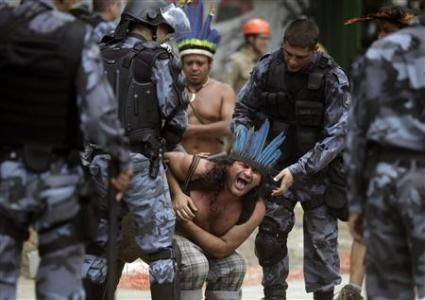
(Reuters) - Police evicted two dozen Amazon natives on Friday from an old Indian museum that will be demolished to clear areas adjacent to Brazil's legendary Maracana soccer stadium, the main venue for next year's World Cup.
The Indians from different Amazon tribes had been living on the grounds of the Rio de Janeiro museum since 2006 and were resisting its demolition, which caused further delays to the overhaul of the stadium complex.
Riot police handcuffed the Indians, some of whom wore feathered headdresses and body paint, and used tear gas to disperse street demonstrations by sympathizers trying to block the eviction.
Brazil is on deadline to deliver stadiums that will host the 2014 World Cup, a global sporting event that is a chance to showcase the South American nation's emergence as a world economic powerhouse. It is also a challenge for its deficient infrastructure that could become an international embarrassment.
Police spokesman Colonel Frederico Caldas said his force tried to negotiate the court-ordered eviction and decided to invade the grounds after the squatters set fire to the museum building, abandoned since 1970.
The museum area was originally planned to become a parking lot for the stadium, but after the protests Rio authorities decided to build a sports museum on the site. The Indians were taken to alternative housing provided by the city.
The final of the 2014 World Cup will be played at Maracana, but work on the refurbished 80,000-seat stadium is behind schedule and the city now expects to deliver the venue to FIFA, the soccer's world governing body, on May 24.
That's just nine days before the stadium is to be tested with a friendly game between Brazil and England on June 2. Only last week workers began laying the pitch, but parts of the roof are still missing and thousands of seats have yet to be fitted.
On June 30, the stadium must host the final of the Confederations Cup, a dress rehearsal for the World Cup.
(Reporting by Rodrigo Viga Gaier and Pedro Fonseca; Writing by Anthony Boadle; Editing by Brian Winter and Vicki Allen)
© Thomson Reuters.




